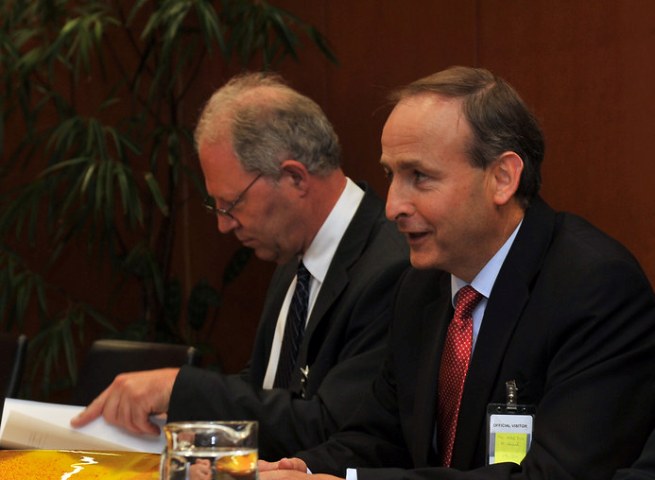Irish PM sees "landing zone" for Brexit after Johnson talks
New Irish Prime Minister Micheál Martin said after his first meeting with British premier Boris Johnson on Thursday that he believes there is a "landing zone" for securing a post-Brexit trade deal between the United Kingdom and the European Union. The United Kingdom, which formally left the EU on Jan. 31, is seeking to negotiate a new free trade accord by the end of the year, when a transition period that maintains the main economic terms of its membership will expire.

New Irish Prime Minister Micheál Martin said after his first meeting with British premier Boris Johnson on Thursday that he believes there is a "landing zone" for securing a post-Brexit trade deal between the United Kingdom and the European Union.
The United Kingdom, which formally left the EU on Jan. 31, is seeking to negotiate a new free trade accord by the end of the year, when a transition period that maintains the main economic terms of its membership will expire. Martin said he and Johnson, who met in British-ruled Northern Ireland, had agreed on the "absolute necessity" that such an accord would be tariff and quota free and on the need to reach a deal as quickly as possible.
"It seems to me that there is a landing zone if that will is there on both sides, and I think it is," said Martin, who became prime minister in June. "My own gut instinct is that there is a shared understanding that we don't need another shock to the economic system that a sub-optimal trade agreement would give alongside of the enormous shock of COVID," he told reporters in Belfast.
On his first visit to Northern Ireland since the COVID-19 pandemic, Johnson sought to talk up the strength of union between Britain's constituent nations. His message echoed that made on a similar trip to Scotland, where polls show support for independence now outstrips that for remaining part of the United Kingdom.
Northern Ireland's views on leaving the United Kingdom are still largely split along sectarian lines, with many Catholics favouring the creation of a united Ireland while pro-British Protestants favour the status quo. The dispute fuelled three decades of bloodshed that largely ended with a 1998 peace deal.
Johnson announced plans to establish two new bodies to work with his government on marking the centenary next year of the creation of Northern Ireland. They have divided opinion among the region's pro-British unionist and Irish nationalist leaders. Northern Ireland's First Minister Arlene Foster of the Democratic Unionist Party welcomed the initiative and called for it to be inclusive.
Deputy First Minister Michelle O'Neill of Sinn Fein, which seeks a united Ireland, said she would resist any "one-sided biased approach from the British government".
(This story has not been edited by Devdiscourse staff and is auto-generated from a syndicated feed.)










